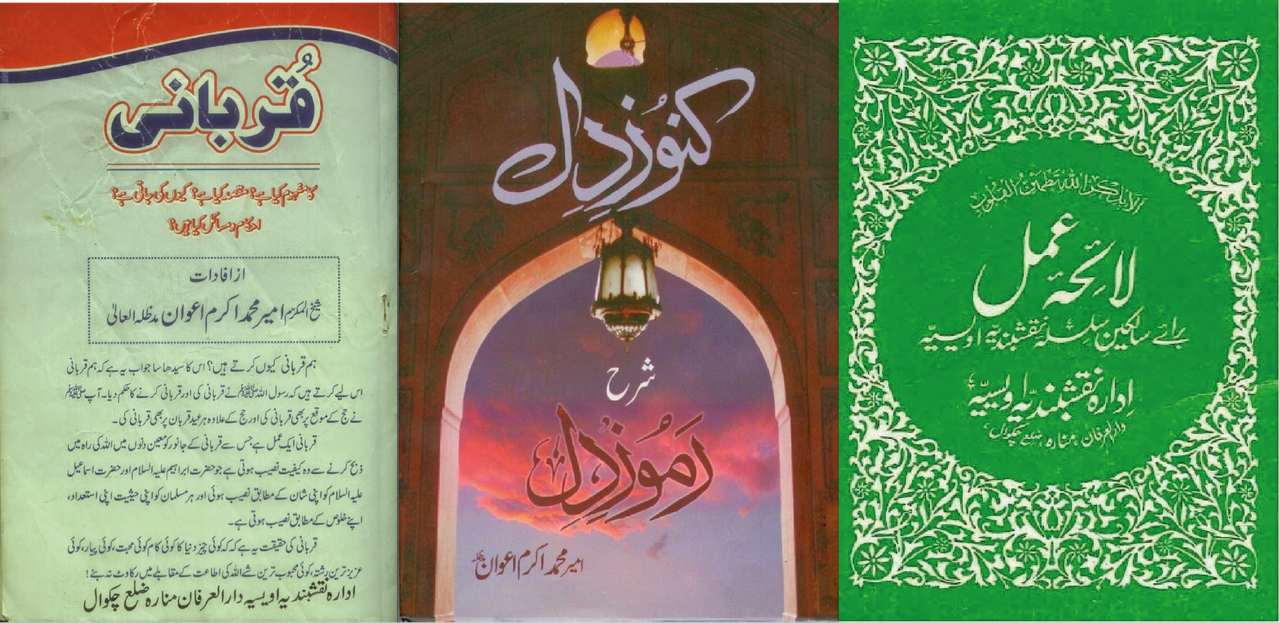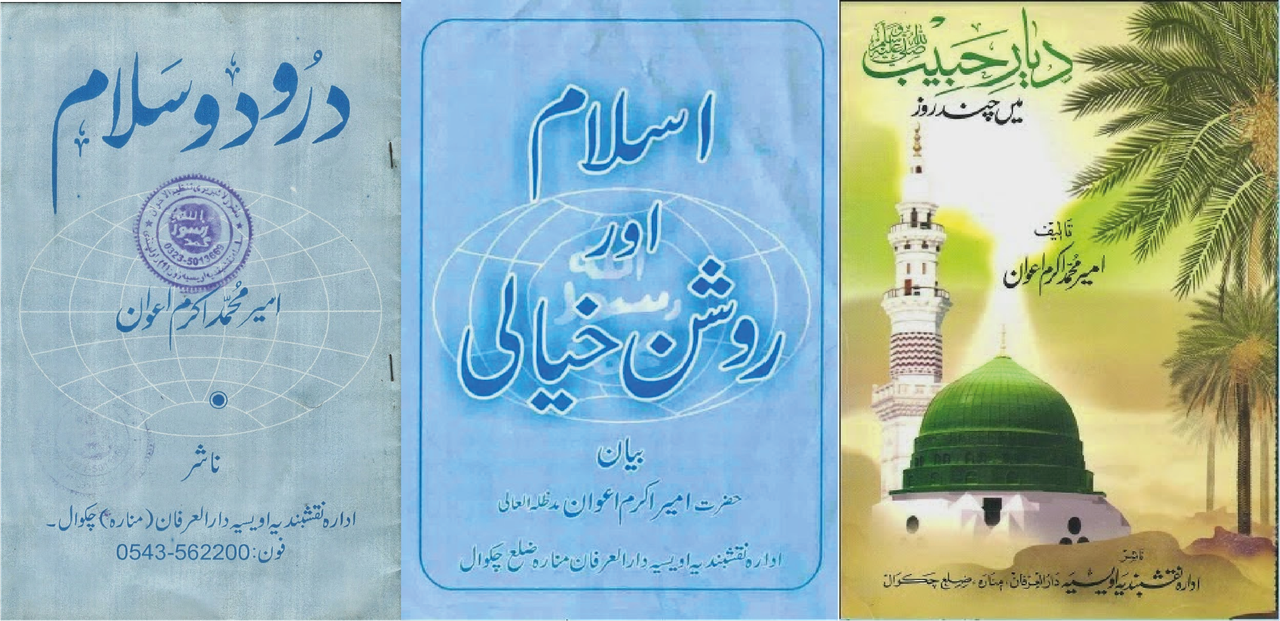Shaykh Muhammad Ishaq Bhatti said: “He was a great scholar, of noble character, a preacher, exegete, debator and researcher, and also a great author”
Shaykh Abdullah Gurdaspuri wrote: “He was a great scholar and had great intizami skills”
Shaykh Inayatullah Naseem wrote: “He was a scholar of great calibre and a diverse skilled personality. He had complete expertise in writing and delivering speeches. He spent all his life for the elevation and rise of Islam and for the revival of the Islamic community. His distinguished attribute was his great love for Islam”
Shaykh Ibrahim was born in 1291/1874 in Sialkot, his father’s name was Seth Qadir Bakhsh. He studied the Quran at home and passed Matric exams in 1895 in Mission High school Gandam Mandi Sialkot. After doing Matric he was admitted in Murree College in Sialkot where he was a class fellow of Allamah Iqbal. After one year in college, his father sent him to Wazeerabad to study under Ustadh Al-Punjab Hafiz Abdul Mannan Wazeerabadi. Thus Shaykh Ibrahim Mir Sialkoti learned all religious sciences from Ustadh Al-Punjab and went afterwards to Delhi where he obtained Ijazah in Hadith from Shaykh Al-Kull Mian Nazeer Husayn Dehlawi. He was among the last generation of students of Shaykh Al-Kull.
After completing his studies, he taught Hadith for some months in Daar Al-Hadith Rehmaniyah Delhi and returned after to Sialkot where he established a Daar Al-Hadith in the Masjid build by his father in the area of Miyanah Pura, and started to teach there.
Many scholars benefitted from Shaykh Sialkoti, his famous students include: Shaykh Muhammad Isma’eel Salafi, Shaykh Ubayd Ar-Rahman Mubarakpuri, Shaykh AbdusSamad Husaynabadi Mubarakpuri, Shaykh Abdul Ala A’zamGharhi, Shaykh Ismatullah Mubarakpuri, Shaykh AbdulMajeed Sohadrawi, Shaykh AbdulWahid Sialkoti.
His services to the Jama’at
When in 1324/1906 “All Ahl e Hadith conference” was formed in Arah (Madras), Shaykh Muhammad Ibrahim was in this gathering. The gathering decided unanimously to elect Hafiz Abdullah Ghazipuri as president and Shaykh Thanaullah Amritsari as its secretary general. The committee was formed to make the conference known in the country and its members were: Shaykh Abdul Aziz Raheemabadi, Shaykh Thanaullah Amritsari and Shaykh Muhammad Ibraheem Mir Sialkoti. This these scholars travelled around the country to make “All India Ahl e Hadith conference” known.
Shaykh Sialkoti was also member of the executive body of “Anjuman Ahl e Hadith Punjab” whose first president in 1920 was Shaykh AbdulQadir Qasuri and secretary general Shaykh Thanaullah Amritsari. The other members of the executive body were: Shaykh Qadhi Muhammad Sulayman Mansurpuri, Shaykh Sayid Muhammad Dawood Ghaznavi, Shaykh Muhammad Isma’eel Salafi, Shaykh Qadhi AbdurRaheem, Shaykh Muhammad Ali Lakhvi and Hakeem Nurudin.
After the creation of the state of Pakistan, Shaykh Muhammad Ibrahim Mir Sialkoti also presided the historical gathering on 24 July 1948 in the Madrasah Dar Al-Uloom Taqwiyatul Islam in Lahore which lead to the creation of “Markazi Jam’iyah Ahl e Hadith Maghrabi Pakistan”. After this gathering Shaykh Sayid Muhammad Dawood Ghaznavi was elected as its president and Professor AbdulQayum as its secretary general, but after a year Shaykh Muhammad Isma’eel Salafi became secretary general as professor AdulQayum resigned due to him being a civil servant.
The scholars present in this gathering were: Shaykh Muhammad Ibrahim Mir Sialkoti, Hafiz Abdullah Ropuri, Hafiz Muhammad Gindalwi, Shaykh Muhammad Isma’eel Salafi, Shaykh Muhiudin Ahmad Qasuri, Shaykh Muhammad Ali Qasuri, Shaykh AbdulMajeed Sohadrawi, Shaykh Zafar Iqbal, Shaykh Muhammad Yunus Dehlawi, Shaykh Abu Sa’eed Sharfudin Dehlawi, Shaykh Sayid Muhammad Dawood Ghaznavi, Shaykh Sayid Isma’eel Ghaznavi, Shaykh Atatullah Haneef Bhujiyani, Shaykh Muhammad Haneef Nadwi and Shaykh Mu’eeunudin Lahvi.
Political services for independence and creation of Pakistan
Shaykh AbdurRasheed Iraqee wrote:
“Shaykh Muhammad Ibraheem Mir Sialkoti has great services in the movement for independence of India. At the end of 1338-1919 with the efforts of Shaykh Al-Islam Thanaullah Amritsari, scholars from all schools of thoughts held a gathering in Delhi which led to the foundation of the organization "Jam'iyah Ullama e Hind".
Shaykh Muhammad Ishaq Bhatti writes: "With the efforts and upon recommendation of Shaykh Thanaullah Amritsari, the organization "Jam'iyah Ullama e Hind" was established and Shaykh Ibrahim Mir Sialkoti was a member of it, and at this time he started to take part in the politics of the country. From the political point of view, it was a very agitated period, and many important topics were facing the people in India at the time and it was necessary to get guidance from the scholars of the religion, topics such as emigration (Hijrah), topic of Khilafah, association with Turks, total lack of cooperation with the British rule, boycott on British schools, colleges, universities, tribunals, and issue of using and propagating national products instead of importing foreign material, and other very important topics about whom it was necessary to consult the religious scholars and know the religious view regarding them. Shaykh Sialkoti because he was among brightest scholars of his era, it was considered necessary to involve him in such gatherings in which such topics would be dealt.”
When in 1919 bloodshed occurred in Jalianwala Bagh in Amritsar, then Muslim league held a gathering concerning this issue in Amritsar, gathering presided by Masih Al-Mulk Hakeem Muhammad Ajmal Khan and the Sadr Al-Majlid and Istiqbaliyah was Shaykh Thanaullah Amritsari. Shaykh Sialkoti was also in this sitting. When in 1930/1349 the historical gathering of Muslim league occurred in Ilahabad presided by Allamah Iqbal in which the wise of orient (Allamah Iqbal) gave the vision of an Islamic state, Shaykh Sialkoti was also in this gathering. On 23 March 1940 in the historical gathering of Muslim league in Minto park in Lahore presided by Qaid e A’zam Muhammad Ali Jinnah, in which the resolution for the creation of Pakistan was passed, Shaykh Sialkoti was also present in this sitting.
When in 1945/1364 Jam’iyah Ullama e Hind opposed the creation of Pakistan and favoured the slogan of a united nation instead of a two state vision, and leaned towards Congress’ views, then Shaykh Muhammad Ibrahim Sialkoti did not agree with it. Shaykh Shabeer Ahmad Uthmani also agreed with Shaykh Sialkoti and they both established a separate organisation in Calcutta under the name “Jam’iyah Ullama e Islam”. Shaykh Shabeer Ahmad Uthmani was its president and Shaykh Sialkoti vice president. Its first sitting was held at the end of 1945 and Shaikh Shabeer Ahmad Uthmani due to illness could not participate in it, hence Shaykh Muhammad Ibrahim Sialkoti presided this gathering…
When Shaykh Abul Qasim Banarsi wrote an Urdu article raising objections to the creation of Pakistan, then Shaykh Ibrahim quickly wrote an article full of evidences and proofs in reply, and he declared objections against Pakistan as non based on reality and justice, and he proved that the people of Islam, the basis of their nation is Islam. The article of Shaykh Muhammad Ibrahim was published in “Roznamah Ihsan” Lahore December 1945. Before it, he wrote in July 1945 a bid epistle entitled “Pegham e Hidayat wa Tayid Pakistan Muslim League” in which he wonderfully criticised with evidences from the Quran and Sunnah the views of those who favoured a united nation. This epistle proved to be an efficient weapon of evidences for those holding the view of a two state theory and the members and supporters of Muslim league took great guidance from it…
The Ahl e Hadith Jama’at also supported the creation of Pakistan and supported Muslim league. In 1946 a great gathering of Jamaat Ahl e Hadith occurred in Calcutta presided by Shaykh Sialkoti. In this gathering Shaykh Thanaullah Amritsari advocated cooperation and unity with Muslim league and Shaykh Ibrahim Mire agreed with this suggestion. This way Muslim league obtained in India many devoted members. (End of Shaykh Abdurrasheed Iraqee words as taken from “40 Ullama Ahl e Hadith”)
1) Translation of Panch Surah
2) Wadhih Al-Bayan fi Tafsir Umm Al-Quran
3) Riyadh Al-Hasanat
4) Tafsir Surah Kahf
5) Tabsirah Ar-Rahman fi Tafsir Al-Quran (Parah 1, 2 3)
6) Ahsan Al-Khitab fi Tafsir Umm Al-Kitab
7) Arais Al-Bayan fi Tafsir Surah Ar-Rahman

Najm Al-Huda fi Tafsir Surah An-Najm
9) Ad-Durar Al-Nazam fi Tafsir Surah Al-Quran Al-Azeem
10) Firqah Najiyah
11) Masail Ramadhan
12) Tawheed Ilahi or Masnoon Zindagi
13) Al-Khair Al-Jari fi Bayan Al-Mukhtas Al-Bari
14) = Fadhail Iman
15) Anwar As-Saati’ah fi Tafsir Surah Al-Waqi’ah
16) Tabligh e Sunnat
17) Risalat wa Bashariyat
18) Bashariyat Rasool
19) Barkat Salah
20) Namaz Masnoon
21) Salat An-Nabi (saw)
22) Ghazah Ghaib bar Janazah Ghaib
23) Anarat Al-Masabeeh fi Salat At-Taraweeh
24) Barkaat Muhammadiyah
25) Namaz e Tahajjud
26) Tablighi Jantri
27) Risalah Ek Rozi
28) Qurat Al-Aynayn bi = Eedayn
29) Guldastah Sunnat
30) Al-Qawl Al-Mubeen min Hadith bil Jahr wal Ikhfa bi Tameen
31) Fadhail Sha’ban
32) Falsafah Arkaan e Islam
33) Halawah Al-Iman bi Tilawah Al-Quran
34) Aman Al-Khaaifeen
35) Qunut An-Naazilah
36) Adaab Tilawat Quran
37) Tayid Al-Quran bi Jawab Ta’weel Al-Quran
38) I’jaz Al-Quran
39) Munazarah
40) Al-Ujalah Al-Khidriyah fil Majma Al-Risalah Al-Bashariyah
41) Akhlaq Muhammadi
42) Ni’ma Ar-Raqeem fi Mawlid An-Nabi Al-Kareem
43) Sirajan wa Munira
44) Al-Qawl As-Sadeed fi Hukm Al-Ijtihad wa Taqleed
45) Al-Kawkab Al-Madhiyah li Izalah Ash-Shubuhat Ash-Shi’ah
46) Khilafat Rashidah
47) Fa buhita lazi Kafar
48) Zad Al-Mutaqeen
49) Seerah Al-Mustafa
50) Azwaj An-Nabi (saw)
51) Ahkam Al-Maram bi Ihya Maathar Ullama Al-Islam
52) Ghazawat Nabawiyah or Futuhat Islamiyah
53) Neen Namah
54) Qawm wa Mazhab (Punjabi)
55) Pegham Hidayat wa Tayid Pakistan Muslim league
56) Kasr As-Saleeb
57) Ismat An-Nabi (saw)
58) Ismat Al-Anbiya
59) Al-Muhaqiq
60) Al-Khabar As-Saheeh ‘an Qabr Al-Maseeh
61) Rasail Thalathah
62) Mirza Ghulam Ahmad Qadiyani ki Bad Zubani
63) Sadae Haqq
64) Khuli Chithi number 1-2
65) Mirza Qadiyani ka Akhri Faisalah
66) Fayslah Rabbani bar Mirza Qadiyani
67) Ihtifal Al-Mahmood min Baladati Lahore
68) Ta’leem Al-Quran
69) Ainah Qadiyani
70) Basharat Muhammadiyah
71) Islah Arab
72) Uswah Hasanah
73) Sharh Hadith Ghudair
74) Tanweer Al-Absar
75) Habeeb Khuda
76) Khutbah Ramadan
77) Ullama Islam
78) Khayr Al-Khalaiq wal Fadhail
79) Qadiyani Mazhab
80) Ismat wa Nubuwwat
81) Shahadatul Quran
82) Khatam e Nubuwwat or Mirza Qadiyani
83) Nuzul Al-Malaikah wa Rooh alal Ardh
84) Nass Khatam e Nubuwwat bi Umum Ad-Da’wah Jamiyah Shareefah
85) Sulam Al-Uloom ila Asrar Ar-Rasool
86) Qadiyani Half ki Haqiqat
87) Kashf Al-Haqaiq yani Ruwaidad Munazarat Qadiyaniyah
88) Tarikh Ahl e Hadith
89) Seerah Muhammadiyah
90) Tarikh Nabawwi
91) Rihlat Qadiyani bar Murg Qadiyani
92) Askaar Masnoonah
93) Sharh Araba’een Nawawi
94) Arab’een Ibrahimi
95) Muraqa’ Qadiyani
96) Ihya Al-Mayit
97) Al-Hajj wa Thajj
98) Quran Ummat or Tareeq Sunnat
99) Thuboot Janazah
100) Tayid Mawdudi Dar Mukhatabah Molana Mawdudi
101) Khutbah Sadarat Jam’iyah Ullama Islam Ijlas Calcutta bi Unwan Tamaddun wa Muasharat Islamiyah
102) Awn Al-Bari ila Uwaisat Al-Bukhari (Arabic)
Shaykh Muhammad Ibrahim Mir passed away on 12 January 1956/ 25 Jumada Ula 1375 in Sialkot. Shaykh Hafiz Abdullah Muhadith Ropuri prayed his funerals. May Allah forgive him, have mercy upon him and make the garden of Firdaws his final residence!
Source: adapted from “Chalis Ullama Ahl e Hadith” of Shaykh AburRasheed Iraqee, Nomani Kutub Khana.































